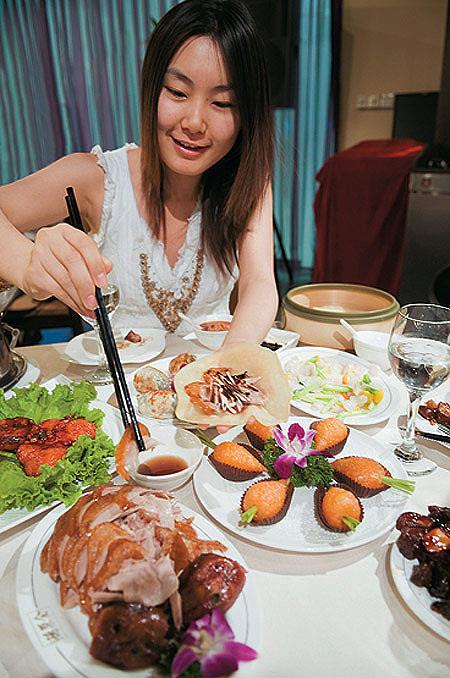For any average Delhiite, such as me, Chinese food is no real mystery. The Oriental cuisine conquered
After three days of being chaperoned around Beijing by the solicitous staff of the hotel I was residing in, and being plied with everything from gourmet Italian and Japanese to Indian — everything but Chinese — I was finally left with a day all to myself. Craving some authentic native food, I set out in the city, resolute to sample at least one proper Chinese meal in China before I caught my flight back home later that night. But nothing had quite prepared me for the culinary revelation I was in for.
2pm: My first surprise, or rather shock, came at the recommended and seemingly innocuous Spice Spirit in The Village, the latter a year-old ritzy mall that stands in arresting contrast to its neighbour, considerably grubby strip of local bars and restaurants — Sanlitun. The menu, I was told by trusted chefs in the city, presented fiery Sichuan cooking — food I knew well. Except for the fried frog legs, snails and various entrails of some unsuspecting bovines, whose pictures stared out at me page after page. I know what you’re thinking, but no, this isn’t what made my eyes pop. Rather, it was the spiciness — literally the only flavour each of my five dishes knew. The fact that every order came drowned in an ocean of chilli sauce, so dark and deep that it was difficult to tell them apart, should have alerted me. But clearly good sense had temporarily abandoned me and I dug in. “Heh, heh, Sichuan food — very spicy,” chuckled my waiter almost perversely as he watched my eyes — and ears — pop, my face instantly a sweaty, flushed mess. Let’s just say if there is such a thing as being killed by a chilli overdose, this is where it will happen.
4pm: Ravenous, disillusioned, but resolve intact, I found myself following my nose (and appetite) to the end of the busy, broad shopping avenue that is Wangfujing Market (Donghuamen Night Market), where its Snack Street begins. Fantasising about delicately steamed dim sum, warm pork bao and many other such street food delights, I entered, all set for an eating extravaganza. A jumble of aromas assaulted me, as I elbowed my way through the raucous multitude to get to one of several brightly lit rows of street food kiosks. On offer was a breadth of culinary experiences, yes. However, dim sum and spring rolls gave way to hundreds of cockroaches, lizards, scorpions, grasshoppers, snakes and even sea horses — all impaled on oversized toothpicks. “Five for 10 yuan,” yelled a purveyor, shoving a stick of five humongous roaches in my face. Now, anyone who knows me even remotely will know that at that moment I was in my worst nightmare. But perhaps this whole day was just one big bad dream. How was it that I was in the land of one of the greatest cuisines, and yet so utterly food deprived? Someone wake me up!
7pm: And then it happened. At Beijing Dadong Roast Duck Restaurant. I arrived here early because a) it was a fairly short cab ride from ‘Shock Street’, b) it was one of Beijing’s top dining hotspots and getting a table wasn’t easy, and c) did I mention that I’m a roast duck fiend?
The most famous of all Beijing’s culinary offerings, roast duck — or Peking duck as it is widely known — dates back to the imperial era, when it was prized by the royal court for its aromatic, crispy skin. Raised on a special diet, the fattened duck is slaughtered after 65 days. Air is pumped under the skin to separate it from the fat. Prior to roasting in a wood-fired oven, the duck is glazed with maltose syrup, which gives it its distinct appearance and flavour. Now, I’ve eaten my share of this Chinese staple in some of the best PD restaurants in and outside my country, but I guess there’s nothing like eating Peking duck in Peking.
Set in the Nan Xin Cang area, a leafy quarter lined with trendy al fresco cafés and interesting restaurants, Dadong is a bustling two-storey space with a bar as you enter (perfect to kill time as you wait your turn) and the dining area one flight up. As if my patience hadn’t been tested enough, I was told my table would be at least an hour. I should have booked ahead. But if you stick around, as I did, I promise you that the reward will be crisp.
No sooner had I placed my order, than an earthy, meaty aroma announced the arrival of this roasted delicacy. Moments later, the architect of this brilliant creation himself rolled a cart over, bearing a whole roast duck, with gorgeous red-brown skin. Two friendly (and mercifully English-speaking) waitresses skipped around my table, adeptly readying it with multiple little saucers and platters for the requisite accompaniments: a deeply flavourful black bean sauce; an addictive garlic-laden paste; finely sliced spring onion, granulated sugar and unlike elsewhere I’ve eaten, two types of pancake — the first a fried, puffed version (like a puri-sized gol guppa) speckled with sesame seeds and the second, the more familiar soft pancake. (I preferred the old reliable.) Then the carving began. Perfectly crackly shards of the crispiest skin ever combined with meltingly tender strips of lean meat (Dadong’s speciality and imperative for a good Peking duck experience). Before I could say chopsticks, my waitresses were skilfully preparing my wraps (again, unlike anywhere else, where they typically leave you to it). A teaspoonful of black bean sauce smoothed on to translucent pancakes, delicate yet resilient; a liberal dash of garlic paste; a neat line of spring onions; a sprinkling of sugar — all crowned with skin and meat in perfect proportion, before being folded (not rolled) into a tidy samosa-like parcel. Gamey, smoky, piquant and sweet; crisp and fragile — each bite yielded a delightful contrast of flavours and textures that give this dish its uniqueness, and suddenly all was forgiven. I was in Peking duck heaven, and that’s all that mattered. And if I’m sounding like a worshipful Peking duck devotee, well, it’s because I am.
Yes, there’s more to Dadong than roast duck. I also sampled some juicy prawns thoughtfully partnered with peanuts and a sweet sauce, a succulent beef steak, icy asparagus enlivened with honey mustard and a superbly inventive dessert of stewed apples encased in a crunchy golden shell of caramelised sugar syrup. But the dish to be had at Dadong is the duck. Not just for the dish itself, but for the experience. For the uninitiated, tackling Peking duck can be intimidating, but Dadong is that rare place that makes even a nervous PD virgin feel like an old hand. Besides, at 8 yuan a head (approximately Rs. 80), it puts little stress on the wallet.
To squeeze as much flavour as you can out of Beijing, you evidently need a whole lot more than a day. But if that’s all you’ve got, book ahead for a table at Dadong and become a Peking duck convert.
China
Chinese cuisine
Oriental cuisine
Leave a Reply
You must be logged in to post a comment.





